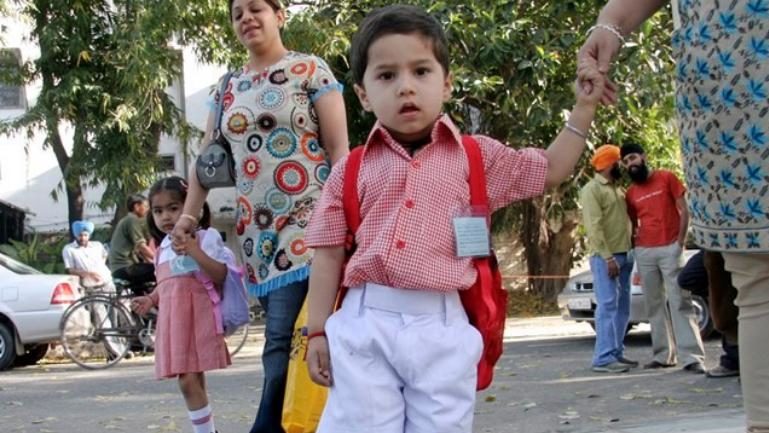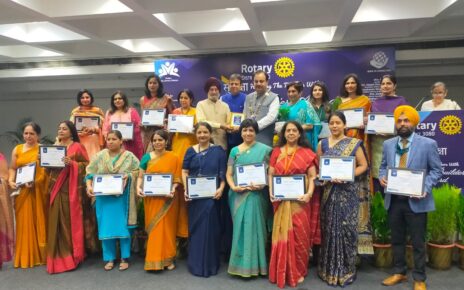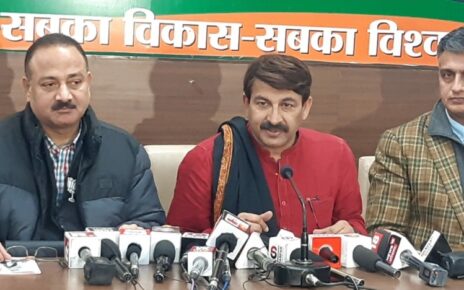For the last seven days, Mamta has spent her afternoon breaks shuttling between prominent private schools of Chandigarh, hoping to collect applications for her son’s admission into nursery. “Some places say they don’t have vacancies for nursery, some ask us to return later or check the websites regularly. Further, for those places that have given the form, filling them is another herculean task,” says Mamta, who lives in Manimajra Modern Complex, where she works as domestic help. Beyond the expenses of her daily commute between schools, and a nominal fee deposit of Rs 100 at the time of form submission, what parents like Mamta suffer to place their children into these highly competitive schools is an incalculable amount of stress. “After all this, I just hope his name comes out in the draw, then all the doors will open for him and all this will be worth it,” adds Mamta.
This stress unites all the parents. “Getting your child admitted in pre-primary is as competitive as an IIT exam now,” says Parmod Kumar, State Program Officer (SPO) for Right to Education (RTE) in the Haryana Education Department. On Thursday, there was news that the Haryana administration had decided to shut down pre-primary education in more than 8,000 private schools across Panchkula. Kumar explains that the schools have not been asked to shut down, but to clean up their act. “There are so many violations of norms and irregularities, we want to centralise the system so that parents are not exploited by these schools. There are regulations set down by the NCERT and the National Commission for Protection of Child Rights that need to be followed,” says Kumar, who advises parents to be wary of the traps of money. “Just because a school is expensive doesn’t mean it is good,” he warns.
Norms violated
Nursery admissions have commenced in most schools of the tricity, and if you go by official websites, the admission process is simple and transparent. “It is based on a draw of lots, this has been the norm for quite a few years, there is no interview or any another selection process. How can we judge these innocent souls? They are all the same to us,” says Atul Khanna, director of Strawberry Fields High School, one of the most coveted schools in the city. A principal from another leading private school with a pricey fee structure that matches Strawberry, says the process of admission is completely transparent and fair. “Each child is special in his own way, we cannot judge these tiny ones based on any criteria,” says the principal.
However, despite these claims of transparency, many parents have struggled to get their children admitted to these schools and cite discrepancies. “Last year, I was trying to admit my child into either Strawberry Fields or Vivek High School. At Strawberry, they had about 160 playschool seats, because they said they don’t take kids directly in nursery. However, out of the 160, only 8 seats were for the general category and a draw of lots was conducted for only these eight seats! What happened to the rest of the seats, god only knows!” claims Neha Sharma, a lawyer from the city, who is now trying to admit her child into nursery. “In Vivek High school as well, for Montessori pre-school, last year they said they will have 55 more seats for nursery this year, because they only about 55 children into pre-nursery, but now these seats seem to have vanished!” adds Sharma.
“We had made no such claim regarding 55 seats for nursery this year, we had seats in playgroup but the date for collecting admission forms was December 2,” says Renu Puri, the principal of Vivek High School.
Most schools have refused to give a transparent division of seats into reserved and non reserved categories on their website. According to regulations circulated by the UT education department, schools are mandated to upload information regarding the number of seats and the “division of seats”. Though many schools have mentioned the number and even stated that preference will be given to children of alumni and siblings of students already enrolled at the school, information regarding the division of these seats into categories is largely absent.
Minority Status
“Whenever there is a complaint regarding these schools and their procedures, we look into it promptly, but nothing more can be done until these issues are brought to us by the parents themselves,” says Rubindrajit Singh Brar, Director of School and Higher Education in Chandigarh. According to Brar, though the government ensures that private schools follow land allotment regulations and Right To Education (RTE) guidelines, they cannot interfere in these schools affairs beyond that. A letter including mandated guidelines is circulated by the UT administration on the fair and transparent conduction of nursery enrollment in the city. However, citing lack of complaints, the department is yet to address other irregularities in the admissions procedure. “We can’t take suo motu action, but if a parent brings something concrete to light, we are here to look into it,” adds Brar.
The administration had previously looked into the matter of the minority status claimed by Vivek High School. The UT government had filed a petition in the Punjab and Haryana High Court, challenging the erstwhile minority status of the school. In August 2018, the court gave orders revoking the minority status of the school, stating that the school only became a minority institute in 2012 and not at the time of its conception. In its petition, the UT administration alleged that this was done to circumvent the Supreme Court’s 2012 judgment enforcing 25 per cent quota reserved for children from EWS households in all private schools, because schools that were deemed minority institutions were exempt from this mandate.
Now St Kabir High School in Sector 26 of Chandigarh is embroiled in a similar legal battle. In late November this year, the High Court sought a reply from the Chandigarh administration on the school’s claim to minority status. Like Vivek, St Kabir’s administration had also claimed the status of a Sikh minority institute in 2014, but the UT administration challenged its status, citing attempts to circumvent mandate to reserve 25 percent for EWS children. However, regardless of the legal dispute, the school has clearly laid out its guidelines for nursery admissions along with a breakup of seats, admission timeline, fees and other charges.
“St Kabir still has quite a transparent procedure I heard, but some others, I don’t even trust their draw of lots. At one private school in Chandigarh, they said that the draw will occur at 3 pm and some parents arrived ten minutes past, and the school authorities told them that the draw had already been done. They didn’t even provide a list of selected students,” says Ruchi Pahwa, whose children now study in Bhawan Vidyalaya, Panchkula. According to Pahwa, though her experience with Bhawan Vidyalaya is quite pleasant, private schools in which she first tried to get her children admitted really disillusioned her. “At Bhawan, they have a very nominal fee…They even take our children for free excursions. In some schools they ask for Rs 1500 just for a visit to the Chandigarh golf club,” says Pahwa.
Unending Expenses
Beyond exorbitant fee structures, some schools also demand that books and uniforms be bought from a certain stationary and clothing store. “Beyond the uniform and the books, they ask us to buy stationary items in bulk every other day. The number of A4 sheets they have requested we buy for our child who is in KG now, could be used by a whole school’s art class I imagine,” says a parent whose child is enrolled in a leading school. The book list for Kindergarten provided by Strawberry Fields High school contains books published by international publishers such as Oxford, Collins and Puffin, all of which cost more than the general NCERT package in government schools. Parents are also asked to buy a total of 35 stationary items, including jenga blocks, fluorescent sheets, clay dough and origami sheets.
Saroj, a young mother from the EWS category whose son is now in the first grade, says that sending her child to a private school is a matter of great pride for her. “I feel so proud telling others about him and where he attends school,” says Saroj. However, maintaining the lifestyle of private school student has not been easy on her pocket. “Every other day they want some new stationary from the child, and they tell us to buy the books and uniformfrom a particular shop. His winter uniform costs about Rs 22,00, and the summer one was for Rs 12,00,” adds Saroj. Still, the young mother believes this investment will be paid back multifold once her child grows up.
But another parent requesting anonymity points out that it is the cost of sustaining a lifestyle after entering these schools that really takes a toll on the parental pockets and on children’ personalities. “It is the shoes one wears in school, the schoolbag you carry, the places you go to shop and party. All of these superficial things matter to these children, often it is a lifestyle hard to sustain and your children get so spoilt, they can never adapt to the outside world. So then you have to send them to luxurious college as well, and the cycle never ends,” claims the parent.
Indeed, walking into Strawberry Fields with its brick lined exteriors draped with delicate ivy like vines, is like walking into a luxury holiday home or hotel. Inside the school, murals and modern art paintings hang on the pastel walls, and children look suave in their natty uniforms. “We devote utmost care to our students. We develop individual education plans according to each student’s needs, and we also give guidance outside of these classes in case these children need extra attention,” says Tina Bajwa, primary school coordinator at Strawberry. A typical KG class at the school is attended by not only a teacher, but an assistant teacher and a helper, who hovers behind the teachers and students, picking up their notebooks and pens and providing other logistical aid.
Rich-poor Divide
“In our school, EWS children are so well assimilated that you cannot distinguish them from other children,” says Prerna Manchanda, head counsellor for the junior wing at Strawberry. She says though the school has done its best to make EWS children feel welcome, it is the parents of these children and the misgivings of some that does not allow them to integrate. “A child from 7th grade came up to me recently and said he feels alienated. He very explicitly spoke about the ameer-gareeb divide. Now that is something he harbors inside him and it’s often hard to change that,” says Manchanda. The counsellor also adds that the integration of EWS children has also compelled the school to become bilingual in order to cater to the language preferences of all.
According to the Right to Education Act, each private school has to reserve 25 per cent seats for EWS students. As the cases of schools attempting to circumvent this mandate by garnering a minority status suggests, many schools are hesitant in teaching these children at par with the children from socio-economically privileged backgrounds. “They believe this will drop the quality of education in their schools, when the fact is that if all the children are taught from the pre-primary level in the same classroom, how can such inequality in performances exist? Now it is up to the educators to ensure that each child feels accepted, comfortable and welcome, so as to perform well,” says a principal of a government school in Manimajra. According to the principal, these allegations of quality dilution due to enrollment of EWS students in private schools is a classist standpoint with no substantial basis.
“Our children in government schools have done so well in the past that no one can match them. It is only this fear of status and a worry that teaching your kids in a government school will compromise their English education that stops parents from sending them here, even though we have the best facilities,” says principal of a government school in Dhanas. According to her, most parents from middle and upper class backgrounds refuse to send their children to government schools for primary and secondary education, but they make the shift to government schools in class 11 and 12 when the kids are busy with coaching classes outside of school for competitive exams,” adds the Principal.
“Indians believe that anything more expensive will also be more valuable, so parents believe if they send their children to a very expensive pre-primary schools, then their children will excel all their lives, plus they wish to keep their child very comfortable,” says Brar, Director of School Education, Chandigarh. Indeed, sending your child to a government school is quite easy on the pocket. Not only do children receive free education up till class eighth, they also receive funds to buy uniforms and books, mid-day meals, budgets for trips and excursions and occassional refreshments.
Govt Schools
The government schools of Chandigarh have of late significantly improved their Class 10 board results. They have also been chosen for the Programme for International Students Assessment (PISA) exam scheduled for 2021. Many schools have already begun work on preparing their students for the PISA, teaching them how to apply concepts and think analytically. It has also been reported that at Rs 28,176 Chandigarh has the highest per child cost in the country. This is the cost incurred or funds spent by the administration for the education of students in the the UT.
Most recently, the former Education Secretary of Chandigarh, BL Sharma, released a handbook on the “Phoenix Project”, a system for evaluating every student’s progress formulated by Sharma himself. The project which is also a mobile application, is used by teachers to input information on each student according to prescribed learning outcomes. Sharma had previously told Newsline that the system was set up to keep each teacher accountable and to make sure that government schools focus on each individual student as much as private schools. “If the system is followed, soon government schoolchildren will be at par with, if not ahead of private school children in terms of education,” said Sharma.
A government school principal sums it up: “Education has become a market, and we all feed this hungry market, without realising that free and quality facilities are already available for all.”




